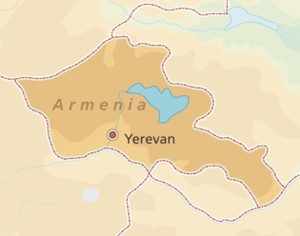 Today the mood in Armenia is that of elation – many people are cheering and dancing to loud music in the streets of the capital, Yerevan, and around the country as they celebrate the resignation of Prime Minister Serzh Sargsyan following 11 days of massive public protests, Giorgi Gogia writes for Human Rights Watch:
Today the mood in Armenia is that of elation – many people are cheering and dancing to loud music in the streets of the capital, Yerevan, and around the country as they celebrate the resignation of Prime Minister Serzh Sargsyan following 11 days of massive public protests, Giorgi Gogia writes for Human Rights Watch:
My mood is relief, considering how many ways the authorities’ response to the protests could have gone wrong. In March 2008, June 2015, and July 2016, I documented how authorities used excessive force to break up largely peaceful demonstrations [and] slammed protest leaders and participants with excessive criminal charges….. This time around, there were sporadic clashes between police and protesters, and authorities arrested hundreds, often arbitrarily. … Tens of thousands of people have flooded Yerevan since April 13, protesting Sargsyan’s shift from president – he just finished his second term – to prime minister. ..People are also angry about election manipulations in Armenia, including vote buying and pressure on public servants to deliver results for the ruling party.
“For the first time since 1991, Armenian people are celebrating domestic political victory, and this sense of empowerment could become a force in itself despite very difficult challenges ahead,” said Lilit Gevorgyan, senior economist for Russia and the former Soviet Union at IHS Markit.
Constitutional amendments approved in 2015 transferred powers from the presidency to the prime minister. By switching office, Sarkisian was effectively extending his chokehold on power, AFP reports.
 “The emotional catalyst was the decision of Sarkisian (right) to stay in power… He promised not to stay, then said he was staying, because ‘the situation changed,'” said Armenian-based political analyst Vigen Hakobyan. “People feel humiliated. The impudence, the lawlessness that is characteristic of oligarchic rule,” he added.
“The emotional catalyst was the decision of Sarkisian (right) to stay in power… He promised not to stay, then said he was staying, because ‘the situation changed,'” said Armenian-based political analyst Vigen Hakobyan. “People feel humiliated. The impudence, the lawlessness that is characteristic of oligarchic rule,” he added.
Victory for civil society
“In Armenia’s 27 years of independence, not one president has ruled more than the permitted two terms or has rewritten the constitution to suit him,” said Grigor Atanesian, a political observer and Fulbright scholar at the University of Missouri. “Sarkisian’s resignation is a victory for civil society,” he added, noting that all sectors of society protested against him.
International factors may facilitate democratic reform, observers suggest.
Geopolitical trends in the region, notably a Russian-Turkish rapprochement and closer Azerbaijan-Russia relations, have prompted Armenia to seek support from the European Union and the United States, said Miriam Lanskoy, senior director for Russia and Eurasia at the National Endowment for Democracy.







